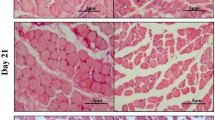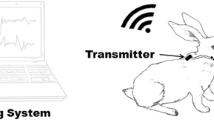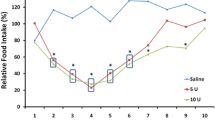Abstract
Objectives
Botulinum toxin A (Botox) is increasingly used for treatment of muscle hyperfunction. For a better understanding of the possible morphologic and chewing changes in patients induced by a therapy with Botox, muscle fiber and myosin heavy chain (MyHC) mRNA alterations were examined in this animal study.
Materials and methods
The investigation was carried out on 14-week-old pigs (seven treated animals, eight controls; calculated animal size with a power of 0.5). To initialise the total immobilisation of the right masseter, the Botox injection was distributed into ten areas. After a 56-day period, muscle tissue was taken from the left and right side of the masseter (three regions), temporal (two regions), medial pterygoid and geniohyoid muscles using a standardized method. The muscle fiber cross sections were examined immunohistochemically. Fiber staining was accomplished with antibodies to specific MyHC isoforms. The MyHC mRNA changes were analysed using real-time RT-PCR.
Results
Muscles adapt to such stress by changing fiber types and MyHC mRNA content. Paralysed masseters display atrophic changes while other masticatory muscles show hypertrophic changes. The results indicated that the typical distributions of type IIa und IIb fiber types in masticatory muscles were increased in the masseter muscles due to Botox application. On the other hand, the masseters without Botox in the treated group showed a significant increase of type I MyHC.
Conclusions
Application of Botox may lead to uncontrolled structural changes in affected and unaffected muscles.
Clinical relevance
Treatment of muscle hypertrophy with Botox may cause muscle imbalance.




Similar content being viewed by others
References
Schumacher GH (1968) Der maxillo-mandibuläre Apparat unter dem Einfluss formgestaltender Faktoren. Nova Acta Leopoldina 33:109–113
Alajbeg IZ, Valentic-Peruzovic M, Alajbeg I, Cifrek M (2006) The influence of age and dental status on elevator and depressor muscle activity. J Oral Rehabil 33:94–101
Herring SW, Rafferty KL, Liu ZJ, Marshall CD (2001) Jaw muscles and the skull in mammals: the biomechanics of mastication. Comp Biochem Physiol A Mol Integr Physiol 131:207–219
Teng S, Herring SW (1998) Compressive loading on bone surfaces from muscular contraction: an in vivo study in the miniature pig, Sus scrofa. J Morphol 238:71–80
van der Bilt A, Engelen L, Pereira LJ, van der Glas HW, Abbink JH (2006) Oral physiology and mastication. Physiol Behav 89:22–27
Frankel R (1980) A functional approach to orofacial orthopaedics. Br J Orthod 7:41–51
Bottinelli R, Canepari M, Pellegrino MA, Reggiani C (1996) Force–velocity properties of human skeletal muscle fibres: myosin heavy chain isoform and temperature dependence. J Physiol 495(Pt 2):573–586
Weiss A, Leinwand LA (1996) The mammalian myosin heavy chain gene family. Annu Rev Cell Dev Biol 12:417–439
Schiaffino S, Reggiani C (1996) Molecular diversity of myofibrillar proteins: gene regulation and functional significance. Physiol Rev 76:371–423
Gedrange T, Luck O, Hesske G, Buttner C, Seibel P, Harzer W (2001) Differential expression of myosin heavy-chain mRNA in muscles of mastication during functional advancement of the mandible in pigs. Arch Oral Biol 46:215–220
Gedrange T, Walter B, Tetzlaff I, Kasper M, Schubert H, Harzer W, Bauer R (2003) Regional alterations in fiber type distribution, capillary density, and blood flow after lower jaw sagittal advancement in pig masticatory muscles. J Dent Res 82:570–574
Gedrange T, Buttner C, Schneider M, Oppitz R, Harzer W (2005) Myosin heavy chain protein and gene expression in the masseter muscle of adult patients with distal or mesial malocclusion. J Appl Genet 46:227–236
Harzer W, Worm M, Gedrange T, Schneider M, Wolf P (2007) Myosin heavy chain mRNA isoforms in masseter muscle before and after orthognathic surgery. Oral Surg Oral Med Oral Pathol Oral Radiol Endod 104:486–490
Bhidayasiri R, Truong DD (2005) Expanding use of botulinum toxin. J Neurol Sci 235:1–9
Rudzinska M, Wojcik M, Szczudlik A (2010) Hemifacial spasm non-motor and motor-related symptoms and their response to botulinum toxin therapy. J Neural Transm 117:765–772
Gadhia K, Walmsley D (2009) The therapeutic use of botulinum toxin in cervical and maxillofacial conditions. Evid Based Dent 10:53
Hoque A, McAndrew M (2009) Use of botulinum toxin in dentistry. N Y State Dent J 75:52–55
Lee SJ, McCall WD Jr, Kim YK, Chung SC, Chung JW (2010) Effect of botulinum toxin injection on nocturnal bruxism: a randomized controlled trial. Am J Phys Med Rehabil 89:16–23
Tan EK, Jankovic J (2000) Treating severe bruxism with botulinum toxin. J Am Dent Assoc 131:211–226
Al-Ahmad HT, Al-Qudah MA (2006) The treatment of masseter hypertrophy with botulinum toxin type A. Saudi Med J 27:397–400
Arikan OK, Tan FU, Kendi T, Koc C (2006) Use of botulinum toxin type A for the treatment of masseteric muscle hypertrophy. J Otolaryngol 35:40–43
Kim HJ, Yum KW, Lee SS, Heo MS, Seo K (2003) Effects of botulinum toxin type A on bilateral masseteric hypertrophy evaluated with computed tomographic measurement. Dermatol Surg 29:484–489
Chang H (2005) Botulism toxin: use in disorders of the temporomandibular joint. Dent Today 24(48):50–51, quiz 51
Schwartz M, Freund B (2002) Treatment of temporomandibular disorders with botulinum toxin. Clin J Pain 18:S198–S203
Gedrange T, Mai R, Richter G, Wolf P, Lupp A, Harzer W (2005) X-ray microanalysis of elements in the masticatory muscle after paresis of the right masseter. J Dent Res 84:1026–1030
Wroblewski R, Arvidsson I, Eriksson E, Jansson E (1987) Changes in elemental composition of human muscle fibres following surgery and immobilization. An X-ray microanalytical study. Acta Physiol Scand 130:491–494
Narusawa M, Fitzsimons RB, Izumo S, Nadal-Ginard B, Rubinstein NA, Kelly AM (1987) Slow myosin in developing rat skeletal muscle. J Cell Biol 104:447–459
Hughes SM, Cho M, Karsch-Mizrachi I, Travis M, Silberstein L, Leinwand LA, Blau HM (1993) Three slow myosin heavy chains sequentially expressed in developing mammalian skeletal muscle. Dev Biol 158:183–199
Klinger W, Muller D (1974) The influence of age on the protein concentration in serum, liver and kidney of rats determined by various methods. Z Versuchstierkd 16:149–153
Heid CA, Stevens J, Livak KJ, Williams PM (1996) Real time quantitative PCR. Genome Res 6:986–994
Borodic GE, Ferrante R, Pearce LB, Smith K (1994) Histologic assessment of dose-related diffusion and muscle fiber response after therapeutic botulinum A toxin injections. Mov Disord 9:31–39
Dodd SL, Selsby J, Payne A, Judge A, Dott C (2005) Botulinum neurotoxin type A causes shifts in myosin heavy chain composition in muscle. Toxicon 46:196–203
Bobinac D, Malnar-Dragojevic D, Bajek S, Soic-Vranic T, Jerkovic R (2000) Muscle fiber type composition and morphometric properties of denervated rat extensor digitorum longus muscle. Croat Med J 41:294–297
DelGaudio JM, Sciote JJ (1997) Changes in myosin expression in denervated laryngeal muscle. Ann Otol Rhinol Laryngol 106:1076–1081
Capra NF, Bernanke JM, Porter JD (1991) Ultrastructural changes in the masseter muscle of Macaca fascicularis resulting from intramuscular injections of botulinum toxin type A. Arch Oral Biol 36:827–836
Wood WW (1987) A review of masticatory muscle function. J Prosthet Dent 57:222–232
Bauer R, Gedrange T, Bauer K, Walter B (2006) Intrauterine growth restriction induces increased capillary density and accelerated type I fiber maturation in newborn pig skeletal muscles. J Perinat Med 34:235–242
Kranjc BS, Sketelj J, D’Albis A, Erzen I (2001) Long-term changes in myosin heavy chain composition after botulinum toxin a injection into rat medial rectus muscle. Invest Ophthalmol Vis Sci 42:3158–3164
Eriksson PO, Thornell LE (1983) Histochemical and morphological muscle-fibre characteristics of the human masseter, the medial pterygoid and the temporal muscles. Arch Oral Biol 28:781–795
Korfage JA, Brugman P, Van Eijden TM (2000) Intermuscular and intramuscular differences in myosin heavy chain composition of the human masticatory muscles. J Neurol Sci 178:95–106
Conflicts of interest
The authors declare that they have no conflict of interest.
Author information
Authors and Affiliations
Corresponding author
Rights and permissions
About this article
Cite this article
Gedrange, T., Gredes, T., Spassov, A. et al. Histological changes and changes in the myosin mRNA content of the porcine masticatory muscles after masseter treatment with botulinum toxin A. Clin Oral Invest 17, 887–896 (2013). https://doi.org/10.1007/s00784-012-0750-0
Received:
Accepted:
Published:
Issue Date:
DOI: https://doi.org/10.1007/s00784-012-0750-0




